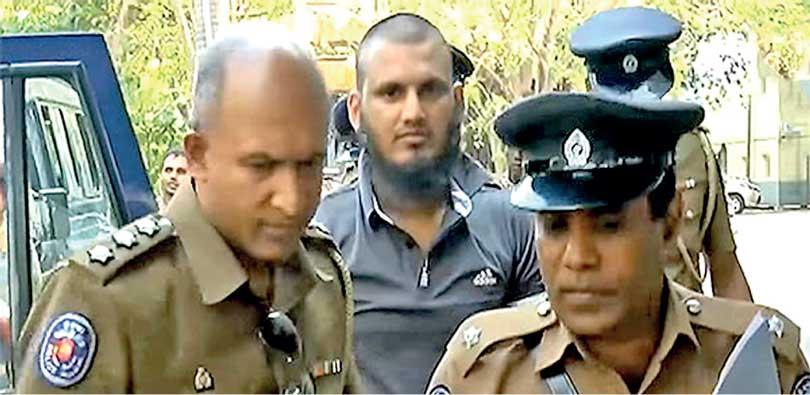10 Jan 2023 - {{hitsCtrl.values.hits}}
 Mohommad Najim Mohommad Imran alias Kanjipani Imran is seen being escorted by policemen from court in December after being bailed out.
Mohommad Najim Mohommad Imran alias Kanjipani Imran is seen being escorted by policemen from court in December after being bailed out.
 Notorious underworld kingpin Mohommad Najim Mohommad Imran alias Kanjipani Imran reportedly fled for India days after he was released on bail by the Colombo Additional Magistrate Harshana Kekunawela on December 20.
Notorious underworld kingpin Mohommad Najim Mohommad Imran alias Kanjipani Imran reportedly fled for India days after he was released on bail by the Colombo Additional Magistrate Harshana Kekunawela on December 20.
Embarrassingly enough, the local authorities came to know of his escape only after the Indian media reported, quoting Indian intelligence authorities that the Sri Lankan underworld boss had sneaked into Tamil Nadu via Rameshwaram.
Imran was a sure-shot flight risk. But the presiding judge and the Attorney General’s department seemed willing to take their chances.
By the time of his release on bail, Imran faced a string of pending cases, including murder, attempted murder and drug smuggling. Previously, he evaded local law enforcement and fled to Dubai, from where he ran underworld operations until the Dubai law enforcement authorities in March 2019 deported the suspect along with Makandure Madush, another underworld gang leader absconding from the law. (Madush was later killed in a crossfire between the underworld and police when he was taken to inspect a hideout in Maligawatte).
When the Emirates flight carrying the suspects landed in Colombo, Imran tried to flee to the Maldives but was apprehended. The suspects were held in remand custody pending investigations.
Flight risk
In August 2019, the court sentenced Imran to six years of rigorous imprisonment after he pleaded guilty to the possession and trafficking of 5.3 kg of cannabis. He appealed against the sentence and was released on bail.
He was later charged with issuing death threats to a police officer and was held under the Prevention of Terrorism Act (PTA).
On December 20, when he was produced before the court under STF protection, the attorney general informed the court that the charges levelled against the suspect did not fall under the PTA, which allowed his lawyers to request bail. He was released on bail on two sureties totalling Rs.10 million - which is peanuts given the extent of Imran’s underworld operation.
He was barred from foreign travel and required to present himself at the Keselwatte police station every last week of the month. Imran left the court disguised, perhaps to evade rival gangs.
Not even his sureties were at the court on the next court day. The magistrate issued summons to sureties to appear in court on the next court day.
Judicial oversight
Intriguingly, Kanjipani Imran’s credentials as a notorious underworld leader, past sentencing and pending cases, and record of absconding law enforcement officials did not deter his release on bail.
Nor did the obvious flight risk posed by the suspect. Given his extensive drug trafficking operation, Imran has contacts with a network of underworld operatives in India, Pakistan and Afghanistan.
Almost all Sri Lankan underworld kingpins now operate from abroad. Last month, India’s National Investigation Agency busted a drug smuggling network of Sri Lankan underworld operatives in a refugee camp in Tamil Nadu.
Now, the Sri Lankan intelligence services are blamed for the cock up. That is the wrong target.
One should ask why neither the judge nor the attorney general considered the very likely flight risk of the suspect. Is it an oversight or foul play?
Disturbingly though, this is also the same judicial system that has kept the terrorist suspects in detention, needlessly so, even more than a decade after the war’s end. Some things are wrong in Sri Lanka’s legal system, and officials are either inadequate or lacking interest in fixing it.
On the other hand, unless specially assigned, tracking the whereabouts of the criminals bailed out from the court is not the mandate of National Intelligence Services. It is police work, or at best, the duty of police intelligence.
National intelligence services should not be overburdened with peripheral issues, which would divert resources allocated to keep track of a list of priority national security issues of domestic terrorism and extremism. The Easter Sunday terrorists exploited the intelligence vacuum created by misplaced priorities and political interference; if you lose sight, history will repeat itself.
In the meantime, Sri Lanka should introduce hardened and targeted laws against underworld criminal networks. Rather than relying on the PTA, which is discredited exactly due to its repeated misuse- organized crime should be made nonbailable offences. And rather than taking some of the unlucky souls to look for hidden arms, where the suspects die a predicted death while trying a miraculous escape or trying to take a gun from the cops, still in handcuffs, the police should act within the law and hold the criminals accountable within the law.
But that might not be possible when the system is broken, and hardcore criminals are bailed out.
Follow @RangaJayasuriya on Twitter
09 Jan 2025 1 hours ago
09 Jan 2025 2 hours ago
09 Jan 2025 2 hours ago
09 Jan 2025 2 hours ago
09 Jan 2025 2 hours ago